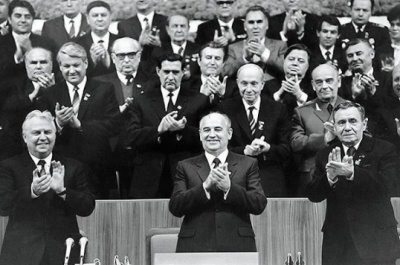Difference between revisions of "Mikhail Gorbachev comes to power"
(Created page with "=== March 11, 1985 === 400px|thumbnail|left The Western world welcomes the election of Mikhail Gorbachev as General Secretary of the Communist Party o...") |
|||
| Line 1: | Line 1: | ||
=== March 11, 1985 === | === March 11, 1985 === | ||
[[File:20thmarch11.jpg|400px|thumbnail|left]] | [[File:20thmarch11.jpg|400px|thumbnail|left]] | ||
| − | The Western world welcomes the election of Mikhail Gorbachev as General Secretary of the Communist Party of the Soviet Union. The 1990 Nobel Peace Prize winner succeeds Konstatin Chernenko and applies his policies of Glasnost and Perestroika. Gorbachev | + | The Western world welcomes the election of Mikhail Gorbachev as General Secretary of the Communist Party of the Soviet Union. The 1990 Nobel Peace Prize winner succeeds Konstatin Chernenko and applies his policies of [[Glasnost]] and Perestroika. Gorbachev's leadership eventually contributes to the conclusion of the Cold War. |
[[Category:20th Anniversary of German Reunification]] | [[Category:20th Anniversary of German Reunification]] | ||
Revision as of 14:36, 31 March 2014
March 11, 1985
The Western world welcomes the election of Mikhail Gorbachev as General Secretary of the Communist Party of the Soviet Union. The 1990 Nobel Peace Prize winner succeeds Konstatin Chernenko and applies his policies of Glasnost and Perestroika. Gorbachev's leadership eventually contributes to the conclusion of the Cold War.
